大学综英Unit 3阅读难点详解
全新版大学英语综合教程3第三单元课后答案

全新版大学英语综合教程3第三单元课后答案2017全新版大学英语综合教程3第三单元课后答案为了帮助大家学习大学英语,店铺整理了全新版大学综合教程3第三单元课后答案,希望能帮到大家!Unit 3 SecurityText AContent Questions1. No.2. No.3. It has been replaced by an era when people employ various secuirty devices at home.4. Small notices announcing that the premises are under surveillance by this security force or thatguard company.5. The insurance company tries to impress the public that it will ensure your safety by paying foryour losses.6. An atmosphere of fear and distrust.7. Because they feel threatened and want to keep outsides away.8. No. They are by now the most sophisticated of security sites.9. It is a way to hold the terrorists, real and imagined, at bay.10. To tell whether their friend or client is telling lies.11. All is done in the name of “security”. But according to the author, America, with all this“security”, is perhaps the most insecure nation in the history of civilization. 12. We may have locked the evils out, but in so doing we have locked ourselves in.Text Organization1.2.1) Doors are not left unlocked either in cities or in rural areas.2) Dead-bolt locks, security chains, electronic alarm systems and trip wires are widely in use.3) Suburban families have steel bars built in sliding glass doors.4) Small notices warning against burglary are commonly seen pasted on the windows of the mostpleasant of homes.5) Access cards are required of those who work with medium to large-size companies.6) Airport security uses electronic X-ray equipment to guard against terrorism.7) Businessmen employ new machines linked up to their telephone to help determine whether thecaller is telling lies or not.Suburban housewives wear rape whistles on their key chains.Text Organization1.2.1) Doors are not left unlocked either in cities or in rural areas.2) Dead-bolt locks, security chains, electronic alarm systems and trip wires are widely in use.3) Suburban families have steel bars built in sliding glass doors.4) Small notices warning against burglary are commonly seen pasted on the windows of the mostpleasant of homes.5) Access cards are required of those who work with medium to large-size companies.6) Airport security uses electronic X-ray equipment to guard against terrorism.7) Businessmen employ new machines linked up to their telephone to help determine whether thecaller is telling lies or not.Suburban housewives wear rape whistles on their key chains.Language Sense EnhancementI. 1) electronic5)7) 9)。
《全新版大学进阶英语综合教程3》Unit3教案(20200701094738)
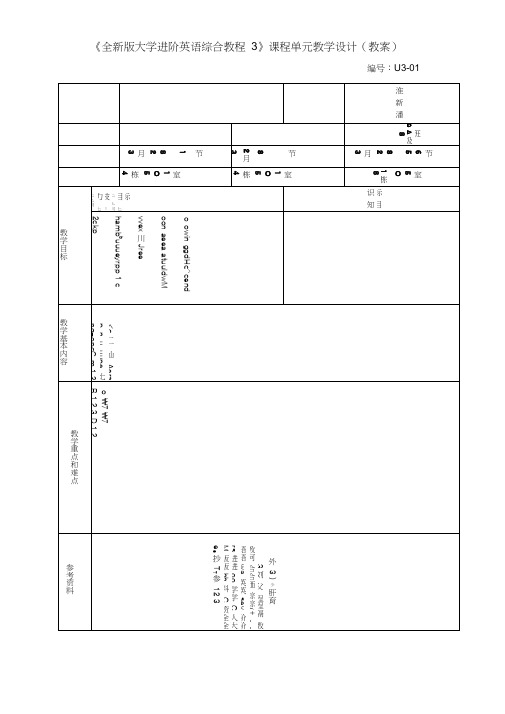
《全新版大学进阶英语综合教程3》课程单元教学设计(教案)编号:U3-01Opener:Pair work: The pictures below compare Westerners (marked in blue) and Chinese (marked in pink) in their way of looking at children and the family, travelling, and the role of the boss in an organization. Look at the pictures an work with your part ner to an swer the questio ns that follow.Helpful Expressi ons接送孩子 drop off and pick up the child 风土人情 local customs and culture 至吐匕一游 been here, done that 高高在上 superiority 有权有势 powerfulQuestio ns:1 In what way does the role of grandparents in Chinese families differ from that in Western families?2 In what way do Western tourists and Chin ese tourists behave differe ntly?3 In what way do Western and Chinese employees differ in the way they look upon their boss?Tips in this part:1. In troduce the topic to the class by ask ing if they can give any example of how Chinese and non-Chinese behave or think differently in life.2. Explai n the pictures in Opener that illustrate the differe nces betwee n the Westerners and Chin ese in their perspective on differe nt issues.3. Ask Ss to look at the pictures and discuss the differences in pairs with the aid of the questi ons that follow.4. To sum up, have differe nt pairs report to the class their discussi on on the pictures, one pair for one picture.Video watchi ng:After watch ing a video clip about an in terview with three foreig n wome n marrying Chinese husbands, discuss the following questions with yourSteps(步骤)教学组织1.whe n what is the differe nee Trave^llfiMg■SiStep One(步骤一)Step Two(步骤二)part ner.《全新版大学进阶英语综合教程3》课程单元教学设计(教案)编号:Comprehe nsion check1. Text Orga ni zati onPair work: This text is organized around the cultural shock the authorexperieneed after the birth of her daughter and her mother-in-law ' fulltime presenee in her family. It can roughly be divided into six parts. Now complete the follow ing table by writ ing dow n the main idea of each part. The first one has been done for you. When you finish, compare notes with your partner.Steps(步骤)教学组织Step One (步骤一)2 Comprehe nsion Check Pair work: With the teacher as guide, you and your partner work on the follow ing comprehe nsion check exercises. 2.1 Diggi ng into detailAn swer the follow ing questi ons to better un dersta nd the text. You may wantto write dow n some key words in the space provided before you do so. (Para. 6) 1 What made the author so mad about her husba nd that they bega n to fight over childcare duties?The fact that he wasn ' t tak ing on half of the childcare duties, and he thought it was more important to spend time on his work than on his daughter, and his expectation that his mother would do all the housework he was supposed to do.(Para. 8) 2 How did her mother-i n-law explai n her role in the family?Her mother-in-law explained that her role in the family was to lighten the burde n of her son, allow ing him to keep his former way of life, and to help her daughter- in-law out with pare nti ng and household man ageme nt.(Para. 9) 3 What did the author think of her mother-in-aw ' s explanation?She thought it was absolutely un acceptable, because, in her view, her husband is one of two parents, and therefore their daughter should be half his responsibility; and she married her husband, not her mother-in-law.(Para. 13) 4 How come her husband, unlike the author, failed to adopt daily habits around the schedule of their daughter?He obviously believed that mothers are the primary caregiver of childre n and this was the no rmal differe nee betwee n mothers and fathers.(Para. 16) 5 How did the author react whe n she was told that, now that her mother-in-law helped her out by taking care of her daughter, it was her resp on sibility to take care of her mother-i n-law whe n she was old?She totally rejected the idea, because she thought what her mother-in-law did was fulfillingthe parenting responsibility of her husband, therefore it was her husband ' s responsibility to take care of his own mother when she was old. 2.2 Un dersta nding difficult senten cesTips in this part :1. Before moving onto the author ' s explou n ttp Ss the text can rough divided into six parts.2. Guide Ss to explore the text by asking them to work on the table in Orga ni zati on and do the task in Digg ing into detail.3. Ask Ss to sum up the differences of views between the author and her mother- in-law on matters described in the text.4. Check Ss' understanding by guiding them through the tasks in Un dersta nding difficult senten ces. Text An alysisThe author ' r eflections on childcare are skilfully framed between the con versati ons with other wives that ope n and close the text. The ope ning sets the scene and introduces her husband and herself. Next comes her mother-in-law, whose strong senseof duty is expressed in a shift to short, emphatic senten ces:“ Her role isclear. She has to be here. ”What follows is part factual account, part persuasive argument. The author does not simply give a neutral description of the differences between her husba nd and herself. She clearly wishes to persuade us that she is right and he is wrong. As a con seque nceher writ ing contains much in com mon with other pieces of persuasive writing. There are therhetorical questions : “lam expected …but he is relieved of his fatherly duties …?” “ Why does he getout of the datasks …?T here is the emotive Ianguage. She is "incensed a f what she sees as hisStep Two(步骤二)“ laz in ess ” ; he “ was n' t honouring ” his role as a father.Towards the end she admits that he has made an effort to compromise, though eve n here she is quick to add “ in resp onse to my growli ngwith the impression of an uneasy truce rather than a meeting of minds.Step Three (步骤三)II. Lan guage FocusWords and expressi ons1. negotiation: n.磋商;谈判e.g. The 6-month negotiations between the two countries ended fruitlessly. 两国谈判半年一无所获。
全新版大学英语第二版综合教程笔记Unit3

Unit 3 Book 1Detailed ReadingI. Difficult Sentences1.Nor can one prevent further advances in the future. (Para. 2)Why is this sentence reversed?(The word “nor” here appears at the beginning of the sentence to give force to the negation.- Nor will I deny that.)2.The only way to prevent further developments would be a global state that suppressed anything new, and human initiative and inventiveness are such that even this wouldn’t succeed. (Para. 2) 1) What is the grammatical function of the first “that”?(Here “that” brings about an attributive clause.)2) What does the structure “such that” here mean?(The structure is used to give an explanation for something.- His manner was such that he would offend everyone he met. )3) What can we infer from this sentence?(No way can suppress anything new, as human initiative and inventiveness do exist.)3.All it would do is slow down the rate of change. (Para. 2)Why is there no “to” between “is” and “slow”?(When “do” appears in the subject of a sentence, the sign“to” of an infinitive which is used as the predicative can be omitted.- The first thing he did was (to) look for a guide.- All we could do now is (to) remain cool-headed.)4.At the moment, the public is in two minds about science. (Para. 3)1) What does “in two minds about” mean?(Unable to decide whether or not you want sth. or want to do sth.- I think she’s in two minds about whether to accept his present or not.)2) What can we learn from the sentence?(The public finds itself holding two contradictory viewpoints about science. On the one hand, it expects the improvement in the standard of living that has been brought by science; on the other hand, it also distrusts science because it does not understand it.)5.It is also an important element behind support for the Green parties. (Para. 3)1) What does “it” refer to?(The public’s distrust of science)2) What part of speech is “support” here?(It is a noun.)6.But in schools science is often presented in a dry and uninteresting manner. (Para. 4) Paraphrase the sentence.(But in schools science is often taught in a dull and boring way.)7.Maybe I would have sold twice as many copies without it. (Para. 4)Translate the sentence into Chinese.(如果不用这个公式的话,也许我能多卖出一倍的书。
大学综英Unit 3阅读难点详解
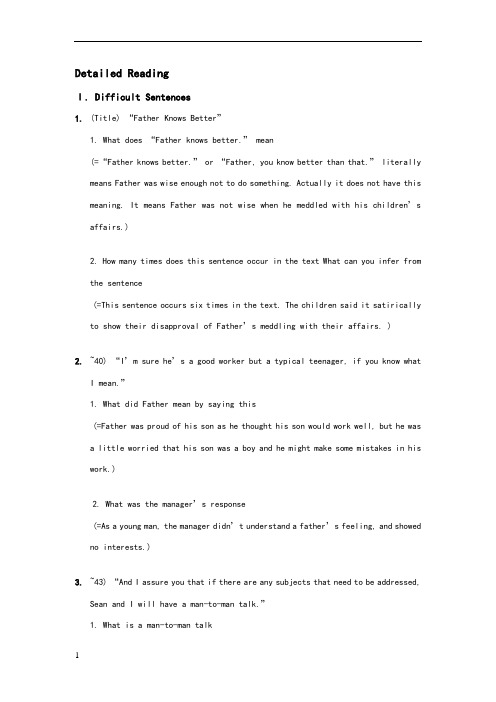
Detailed ReadingⅠ. Difficult Sentences1.(Title) “Father Knows Better”1. What does “Father knows better.” mean(=“Father knows better.” or “Father, you know better than that.” literally means Father was wise enough not to do something. Actually it does not have this meaning. It means Father was not wise when he meddled with his children’s affairs.)2. How many times does this sentence occur in the text What can you infer fromthe sentence(=This sentence occurs six times in the text. The children said it satirically to show their disapproval of Father’s meddling with their affairs. )2.~40) “I’m sure he’s a good worker but a typical teenager, if you know whatI mean.”1. What did Father mean by saying this(=Father was proud of his son as he thought his son would work well, but he wasa little worried that his son was a boy and he might make some mistakes in hiswork.)2. What was the manager’s response(=As a young man, the manager didn’t understand a father’s feeling, and showed no interests.)3.~43) “And I assure you that if there are any subjects that need to be addressed,Sean and I will have a man-to-man talk.”1. What is a man-to-man talk(=A talk that takes place between two men, especially two men who need to discussa serious personal matter.)2. Translate the sentence into Chinese.(=你放心,要是有什么问题需要解决的话,我和肖恩会开诚布公地谈一谈的。
大学英语综合教程3课后习题问题详解
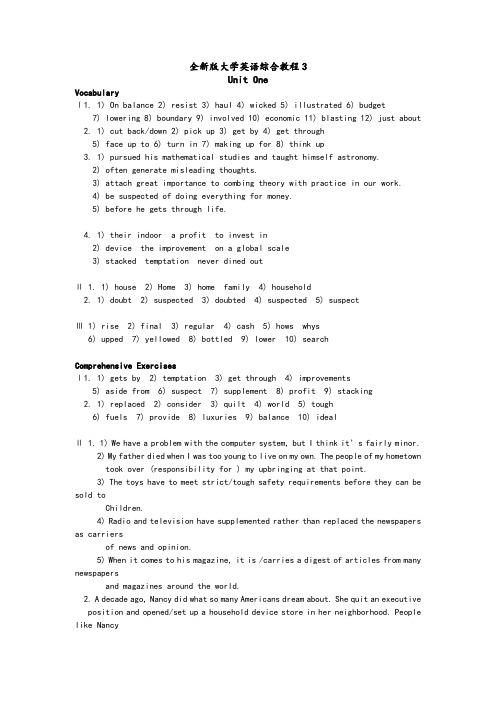
全新版大学英语综合教程3Unit OneVocabularyⅠ1. 1) On balance 2) resist 3) haul 4) wicked 5) illustrated 6) budget7) lowering 8) boundary 9) involved 10) economic 11) blasting 12) just about 2. 1) cut back/down 2) pick up 3) get by 4) get through5) face up to 6) turn in 7) making up for 8) think up3. 1) pursued his mathematical studies and taught himself astronomy.2) often generate misleading thoughts.3) attach great importance to combing theory with practice in our work.4) be suspected of doing everything for money.5) before he gets through life.4. 1) their indoor a profit to invest in2) device the improvement on a global scale3) stacked temptation never dined outⅡ 1. 1) house 2) Home 3) home family 4) household2. 1) doubt 2) suspected 3) doubted 4) suspected 5) suspectⅢ 1) rise 2) final 3) regular 4) cash 5) hows whys6) upped 7) yellowed 8) bottled 9) lower 10) searchComprehensive ExercisesⅠ1. 1) gets by 2) temptation 3) get through 4) improvements5) aside from 6) suspect 7) supplement 8) profit 9) stacking2. 1) replaced 2) consider 3) quilt 4) world 5) tough6) fuels 7) provide 8) luxuries 9) balance 10) idealⅡ 1. 1) We have a problem with the computer system, but I think it’s fairly minor.2) My father died when I was too young to live on my own. The people of my hometown took over (responsibility for ) my upbringing at that point.3) The toys have to meet strict/tough safety requirements before they can be sold toChildren.4) Radio and television have supplemented rather than replaced the newspapers as carriersof news and opinion.5) When it comes to his magazine, it is /carries a digest of articles from many newspapersand magazines around the world.2. A decade ago, Nancy did what so many Americans dream about. She quit an executive position and opened/set up a household device store in her neighborhood. People like Nancymake the decision primarily for the improvement in the quality of their lives. But, to run a business on a small scale is by no means an easy job. Without her steady income,Nancy had to cut back on her daily expenses. Sometimes she did not even have the money topay the premises for the various kinds of insurance she needed.Fortunately, through her own hard work, she has now got through the most difficult time. Sheis determined to continue pursuing her vision of a better life.Unit TwoVocabularyⅠ1. 1) decades 2) historic 3)imposed 4) religious 5) slender 6) web7) bade 8) site 9) on the side 10) authorized 11) terminal 12) make the best of2. 1) went through 2)stood up for 3) laid down 4) take on5) let (us) down 6) draw on 7) fall into 8) pass for3. 1) are fully confident that the Americans will not be able to justify their measures to protectthe struggling American steel industry.2)in the eyes of Joe Klein, staff writer of the New Yorker and author of the Natural, the mosttalented politician of his generation and the most compelling.3) people are really intent on destroying themselves with drugs.4)could forge a completely different approach to life.5) is our conviction that cloning of human beings in bound to cause many ethical and socialproblems in the long run.4. 1) As for do not compel capture of have forged2)At huge risk the mission shelter3) who abolished In the eyes of racialⅡ 1. I’ll tell you in a minute how I have attained the genuine sense of belong in America, but firstlet me hear about your French trip.2. Most McDonald’s look almost the same on the outside, but actually there are about 16different basic designs.3. Loaning money from the banks is but one of the methods we can use to get throughafinancial crisis4. This second-hand car has been nothing but trouble: it’s always breaking down.5. In your resume you’ve mentioned everything but one vital point.6. Our technicians have discovered a simple but effective solution to the problem.7. I am sorry, but I think you shouldn’t have lingered on over coffee and missedthe last bus.8. The bankruptcy of the company was not caused by evil, but by simple ignorance.Ⅲ 1) lonely 2) friendly 3)weekly monthly 4) lovely 5) cowardly6) kindly/saintly 7) lively 8) motherlyComprehensive ExercisesⅠ1. 1) forged 2) stand up 3) compelled 4) convictions5) mission 6) abolish 7) intent on 8) risk 9) in the eyes of 10) threats2. 1) assistance 2) involved 3)estimated 4) coincidence 5) emerged6) referred 7)numerous 8) stationed 9)concern 10) captureⅡ 1. 1) Though greatly affected by the consequences of the global financial crisis,we are stillconfident that we can face up to the challenge and overcome the crisis.2) Under threat of constant sand storms, we were compelled to leave our cherished villageand move to the new settlement.3) According to a recent online survey, a lot of consumers say they may be motivated toconsider buying products shown in TV commercials.4) Having spotted a truck driver dumping contaminated waste alongside the river, the oldman reported to the police at once.5) Some scientists hold to the firm conviction that people will come to like geneticallymodified crops someday since they can increase yields and help combat hunger anddisease in the developing world.2. Shortly after he achieved freedom Henson became intent on assisting fugitive slaves. He secretly returned to the United States from Canada several times to help others to travel the Underground Railroad to freedom. Once some slave catchers closedin on the escaping slaves and Henson when they were on the run. He disguised them and successfully avoided capture. Later he built a small settlement in Dresden, Canada for escaped slaves, setting up a chapel and a school. He held to the conviction that slavery would be abolished, and the day was bound to come when racial discrimination no longer existed.Unit ThreeVocabularyⅠ1. 1) threatens 2) by a small margin 3) civilize 4) closed up 5)wandered 6)paste7) without so much as 8) sideways 9) hook up to 10) universal 11) chart 12) Bathedin2. 1) narrowed down 2) looked back on 3) cut off 4) fit into5) wear (the other) down 6) lies in 7) put up 8) stand for3. 1) which is likely to make people vulnerable to asthma has been found by researchers at theDepartment of Clinical Medicine in Oxford.2)with mirrored doors had to be built in so as to make their small bedroom look larger.3) feature the space shuttle Challenger blowing up in January 1986--- killing all seven crew.4)threatened to keep the pupils in after school they were quieted at once.5) are a major barrier to the country’s economic growth due to the fact that imported oil hasabsorbed 40%of its foreign exchange/ because imported oil has absorbed 40% of itsforeign exchange.4. 1) looked back on atmosphere urban life2)era hooked up to the the electronic3) the suburb a sophisticated system analyze make errorsⅡ 1. 1) away 2) in/inside 3) forward/ through 4) back5) off 6) home 7) back down 8) in outⅢ 1. Internet is not such a unusual word as it used to be2. Most men do not look unattractive in them3. Wealthy as she is, she is not unconcerned by her sudden unemployment4. This claim is not unrealistic in view of a sharp decrease in the city’s violent crimes5. His poor health is not unrelated to his unhealthy way of lifeComprehensive ExercisesⅠ1. 1) Statistics 2) rural 3) era 4) stood for5) on the latch 6) vulnerable 7) barriers 8) electronic 9) reflection 10) civilized2. 1) tougher 2) liable 3)shift 4) electric 5)cautious6) sophisticated 7) thieves 8) break 9) chances 10)signsⅡ 1. 1) The Internet is changing the way people live, no matter whether they are in urban or ruralareas.2) Medium-sized and small companied are more vulnerable to the threat of the globaleconomic crisis than large ones.3) With regard to our term papers, the professor asked us to analyze the chart ofunemployment first, and then provide critical reflections on the nation’s economicdevelopment.4) It never occurred to him that their team would win the basketball match bya largemargin.5) Looking back on my twenty years’ teaching in high school, I attributed my success topatience, talent, and the constant pursuit of knowledge.2. It is almost impossible to keep a determined burglar out. All you can do is discourage him for a few minutes, thus exposing him to police patrols. Common sense tells us that lighting is a barrier to criminal activity. A light should be fixed in the doorway and switched on at night. Make sure that you don’t leave the door on the latch if you happen to be the last to come in. If you decide to buy a sophisticated electronic alarm system, be sure to ask for its signs and put them up on both windows and doors. In addition you may have it hooked up to a police station.Unit FourVocabularyⅠ1. 1) accordingly 2) loose 3) concentration 4) stimulating 5)fabric 6) if anything7) reality 8) intuition 9) trifle 10) at the turn of the century 11) mess 12) undermine2. 1) approve 2) slow down 3) take in 4) sucked into5) set apart 6) dozed off 7) call forth 8) stretch into 9) keep up with 10) believe in3. 1) provided inspiration for many artists and musicians over the decades.2)is credited to his powers of imagination.3) on the foundations of an agricultural revolution.4) not to make ant complaints in the presence of the nurse.5) the outbreak of the Second World War4. 1) flaw came to the conclusion would get nowhere2) in a row dozed off a mess of3) outbreak of has undermined has strainedⅡ 1. With Christmas only a week away2. With his physical condition improving day by day3. With our GDP growing steadily4. With all the shops closed5. With her eyes closed6. With the fog lifting during the nightⅢ 1) like/as 2) as 3) like 4) like/as 5) as/like6) as 7) like 8) asComprehensive ExercisesⅠ1. 1) caution 2) came to the conclusion 3) never get anywhere 4) undermining5)not give/care a fig 6) flaw 7) beyond any doubt 8) foundation9) remarkable/impressive 10) imagination2. 1) extent 2) inventions 3) bet 4) manages 5) vision6) eventually 7) achievement 8) poverty 9) utilized 10) breakthroughⅡ 1. 1) The volunteers sent/assigned by the Red Cross disinfected, with great caution, thedrinking water in the village so as to avoid an outbreak of plague.2) Einstein spent many years trying to unify the theories of electro magnetism and gravity butfailed.3) Professor Wang received/won the Presidental Award for his excellence in stimulatingstudents’ creative imagination.4) As there were some major design flaws, the board of directors didn’t approve of theeconomic stimulus package.5) Having realized that nobody could help him, Jordan finally came to the conclusion thathe had to face reality and take up/meet the challenge by himself.2. What was remarkable about 2005 was perhaps that the United Nations declared it “The World Year of Physics”. It was the 100th anniversary of Einstein’s theory of relativity and the 50th anniversary of his death. In 1905 Einstein published five highly important essays in the history of science, thus revolutionizing physics. His great achievements can be credited to his impressive powers of imagination, constant questioning, and not giving a fig for authority. It is beyond doubt that Einstein was the greatest scientist in the 20th century.Unit OneVocabularyⅠ1. 1) sprinkled 2) in turn 3) reversed 4) repay 5) at sea 6) traditional7) statement 8) longed for 9) in secret 10) unloaded 11) weep 12) under way 2. 1) stretch out 2) make out 3) hope for 4) turns over5) put away 6) brings back 7) got to 8) go about3. 1) diminish, people are working to increase the use of solar energy.2)accord high priority to meeting the challenges of economic and environmental development in the region.3) are exposed to more information than were children of the past, it does not follow that theyautomatically become more sophisticated.4)been immersed in British history and culture.5) in a flash on June 1, 2000 when he lost both legs in a serious traffic accident.4. 1) my sincere considerate of with gratitude2)assembled amid the in quest of3) was marvelous had undergone swift and the restⅡ 1. 1) fond of 2) sick of 3)thoughtful of 4) confident of5) conscious of 6) critical of 7) guilty of 8) ashamed ofⅢ 1) To know what people really think, pay regard to what they do, rather than what they say.2) It is cooperation, rather than conflict, that will enable you to achieve your success.3) Ann made students think for themselves rather than telling them what to think.4) I think I’ll stay at home this evening rather than go/going out.5) Most people are content to let perfect days happen at random rather than plan/planning forthem.Comprehensive ExercisesⅠ1. 1) at sea 2) Turning over 3) reverse 4) got to5) repay 6) gratitude 7) assembled 8) immersed in 9) unloading 10) swift 2. 1) Instead 2) possessions 3) richer 4) breath 5) cherish6) special 7) specific 8) shining 9) miracles 10) giftⅡ 1. 1) Grandma took it for granted that food prices would soar, so she bought a lot of rice.2) I can quote you several instances of her dedication to science.3)The 1980s saw the start of the swift development of some special economic zones inChina.4) Tension between the two countries stemmed in part from the latest spy affair.5) Peter has worked in a law firm for many years. You can consider having him as yourlawyer to act on your behalf when you need legal help.2. Amid the atmosphere of Thanksgiving George was immersed in the diary left to him by his father, who died at sea after he completed two successive trips around the world. The diary brought back every moment George had spent with his father and many of the specific things his father did on his behalf. George’s father used to impress on him the need to undergo all kinds of hardship in quest of excellence. Even today, George still remembers how his father would quote Aesop’s famous saying “ Gratitude is the sign of noble souls ” and tell him to accord the greatest importance to it.Unit SixVocabularyⅠ1. 1) masterpieces 2) fragile 3) fancy 4) nonsense 5) cling to 6) endure7) acute 8) whistle 9) mock 10) subtracted 11) sin 12) flutter/fluttering 2. 1) gave in/ gave up 2) figure out 3) sized up 4) wiped out5) pulling up 6) wear away 7) sit up 8) hear of/about3. 1) usually stand out in childhood memories.2)a joint bachelor’s degree program in environmental studies together with DukeUniversity.3) still stalks the country.4)scarcely any surface water in the desert.5) for change in the election law is so persistent that both houses have promised to consider it. 4. 1) dreary mingled with not to excess a merry2)called to us in a whisper in tune with3) backward wet through won’t hear of turn loose yourⅡ 1. He went to Paris on business last month.2. The train to Brussels goes at 2:25 p.m.3. As soon as they arrived at the meadow, the shepherd let the sheep go.4. We went exploring together in the mountains./ We will go exploring together in theMountains.5. Let’s go and have a drink in the bar.6. The store is going to close up soon.7. South Koreans went crazy when their soccer players beat the Spanish team in thequarter-finals.8. When the mother came out of the house, she found her children gone.Ⅲ 1) a little white wooden house 2) long, curly red hair3) a large old round table 4) a cheap Indian restaurant5) a huge cool chocolate ice-cream6) rapid technological 7) a handsome young Chinese AmericanComprehensive ExercisesⅠ1. 1) in tune 2) Scarcely 3) in a whisper 4) cling to5) merry 6)sat up 7) nonsense 8) fancy 9) sin 10) masterpiece2. 1) mission 2) involve 3) jail 4) not 5) collect6) deliver 7) beautiful 8) vacation 9) need 10) smallⅡ 1. 1) The red house stands out against the old trees that reach high up to the sky.2)The salary in/ for my new job is great, but for the rest, I’m not satisfied.3) The waters of the two streams mingle near our village.4) We should not mock at other people’s religious beliefs.5) The curtains of the room are not quite in tune with the style of the furniture, 2. Here and there we see young artists who stand out from other people. They may be in worn-out jeans all the year round, or walk barefoot/ in bare feet even in winter, or drink to excess, or cling to the fancy of creating a masterpiece without actuallydoing any creative work. In fact, many of them act like this just to look the part, or to be in tune with other artists. They have forgotten that only through persistent effort can one achieve success.。
综合英语3unit3解析
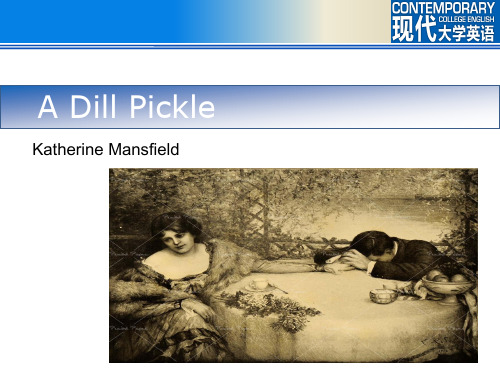
A Dill Pickle
Unit 3
Author
Background
History
Background
Author
Katherine Mansfield (1888-1923) • rebellious, dangerously witty, and
Her Life
Background
Author
Her Works
• In a German Pension (1911) • The Garden Party: and Other Stories (1922) • The Doves’ Nest: and Other Stories (1923) • Bliss: and Other Stories (1923) ➢ Stream of consciousness ➢ Characters’ psychological activities with detailed
Objectives
Unit 3
Warming up
Warming up Questions/Activities
1. Retelling Reconstruct the story by chronological order—how they fell in love and then broke up, what might have happened to each of them during the time before they met again.
descriptions and symbolism
新实用标准大学英语综合教程3课后问题详解Unit1-3
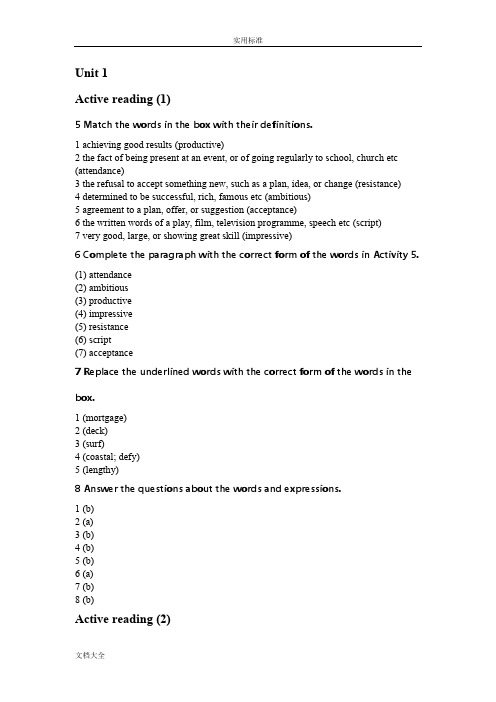
Unit 1Active reading (1)5 Match the words in the box with their definitions.1 achieving good results (productive)2 the fact of being present at an event, or of going regularly to school, church etc (attendance)3 the refusal to accept something new, such as a plan, idea, or change (resistance)4 determined to be successful, rich, famous etc (ambitious)5 agreement to a plan, offer, or suggestion (acceptance)6 the written words of a play, film, television programme, speech etc (script)7 very good, large, or showing great skill (impressive)6 Complete the paragraph with the correct form of the words in Activity 5.(1) attendance(2) ambitious(3) productive(4) impressive(5) resistance(6) script(7) acceptance7 Replace the underlined words with the correct form of the words in the box.1 (mortgage)2 (deck)3 (surf)4 (coastal; defy)5 (lengthy)8 Answer the questions about the words and expressions.1 (b)2 (a)3 (b)4 (b)5 (b)6 (a)7 (b)8 (b)Active reading (2)4 Match the words in the box with their definitions.1 involving three things of the same kind (triple)2 an area of ground where dead people are buried (cemetery)3 the part of a place or thing that is at the back (rear)4 a book that someone writes about someone else’s life (biography)5 to put people or things into a space that is too small (cram)6 at the very beginning of a career and likely to be successful at it (budding)7 continuing only for a limited time or distance (finite)8 to pass (elapse)5 Complete the sentences with the correct form of the words in Activity 4.1 elapsed ,cemetery2 rear,crammed3 triple4 budding ,biography5 finite6 Answer the questions about the words.1 (a)2 (b)3 (a)4 (a)5 (b)6 (b)7 (a)8 (a)7 Answer the questions about the phrases.1 (a)2 (b)3 (b)4 (a)5 (a)6 (b)7 (b)8 (b)9 (a)Language in use (Omitted)7 Translate the paragraphs into English.1 对于是否应该在大学期间详细规划自己的未来,学生们意见不一。
大学体验英语综合教程课堂辅导Book 3Unit 1-passage b-难点精讲
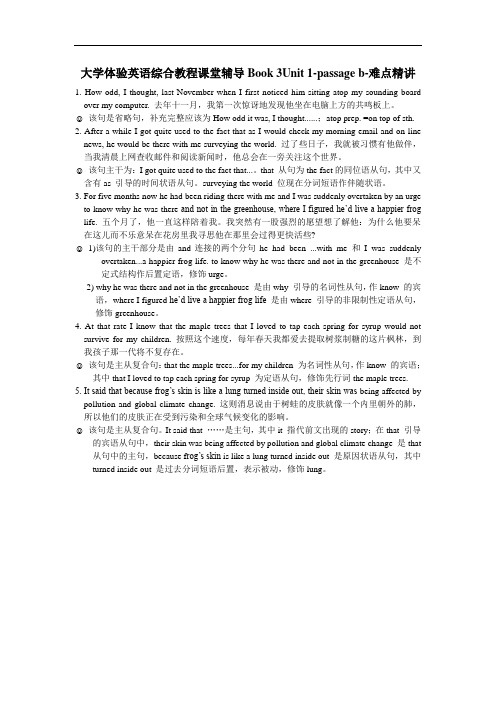
大学体验英语综合教程课堂辅导Book 3Unit 1-passage b-难点精讲1. How odd, I thought, last November when I first noticed him sitting atop my sounding board over my computer. 去年十一月,我第一次惊讶地发现他坐在电脑上方的共鸣板上。
☺该句是省略句,补充完整应该为How odd it was, I thought......;atop prep. =on top of sth.2. After a while I got quite used to the fact that as I would check my morning email and on-line news, he would be there with me surveying the world. 过了些日子,我就被习惯有他做伴,当我清晨上网查收邮件和阅读新闻时,他总会在一旁关注这个世界。
☺该句主干为:I got quite used to the fact that...。
that 从句为the fact的同位语从句,其中又含有as 引导的时间状语从句。
surveying the world 位现在分词短语作伴随状语。
3. For five months now he had been riding there with me and I was suddenly overtaken by an urge to know why he was there and not in the greenhouse, where I figured he’d live a happier frog life. 五个月了,他一直这样陪着我。
我突然有一股强烈的愿望想了解他:为什么他要呆在这儿而不乐意呆在花房里我寻思他在那里会过得更快活些?☺1)该句的主干部分是由and连接的两个分句he had been ...with me 和I was suddenly overtaken...a happier frog life. to know why he was there and not in the greenhouse 是不定式结构作后置定语,修饰urge。
- 1、下载文档前请自行甄别文档内容的完整性,平台不提供额外的编辑、内容补充、找答案等附加服务。
- 2、"仅部分预览"的文档,不可在线预览部分如存在完整性等问题,可反馈申请退款(可完整预览的文档不适用该条件!)。
- 3、如文档侵犯您的权益,请联系客服反馈,我们会尽快为您处理(人工客服工作时间:9:00-18:30)。
Detailed ReadingⅠ. Difficult Sentences1. (Title) “Father Knows Better”1. What does “Father knows better.” mean?(=“Father knows better.” or “Father, you know better than that.” literally means Father was wise enough not to do something. Actually it does not have this meaning. It means Father was not wise when he meddled with his children’s affairs.)2. How many times does this sentence occur in the text? What can you infer from thesentence?(=This sentence occurs six times in the text. The children said it satirically to show their disapproval of Father’s meddling with their affairs. )2. (LL.39~40) “I’m sure he’s a good worker but a typical teenager, if you know what I mean.”1. What did Father mean by saying this?(=Father was proud of his son as he thought his son would work well, but he was a little worried that his son was a boy and he might make some mistakes in his work.)2. What was the manager’s response?(=As a young man, the manager didn’t understand a father’s feeling, and showed no interests.)3. (LL.42~43) “And I assure you that if there are any subjects that need to be addressed, Seanand I will have a man-to-man talk.”1. What is a man-to-man talk?(=A talk that takes place between two men, especially two men who need to discuss a serious personal matter.)2. Translate the sentence into Chinese.(=你放心,要是有什么问题需要解决的话,我和肖恩会开诚布公地谈一谈的。
)4. (LL.60~61) “If that sort of thing happened only once in a while, it wouldn’t be so bad. Overall,I wouldn’t want to trade my dad for anyone else’s.”What can you infer from the sentence?(=Father was always meddling with his children’s affairs, and the children disliked it.However, the children loved Father and if he interfered with their affairs only once in a while, they could bear it. )5. (LL.91~92) “Through clenched teeth, the words are in a monotone and evenly spaced.”Translate the sentence into Chinese.(=咬紧牙,一字一顿地说。
)6. (L.134) “Why back in my day–”1. Paraphrase the sentence.(=Well, when I was young, we didn’t behave like that.)2. What does the sentence imply?(=It implies a gap between the young generation and the older generation.)7. (L.138) “Get this over with, more likely.”1. What is the correct order of this sentence?(=It is more likely to get this over with. )2. Translate the sentence into Chinese.(=还不如说,是把这份罪受完算了。
)8. (LL.166~168) “And it’s not just one of us who’ve felt the heavy hand of i nterference. Oh, no,all three of us live in constant dread knowing that at any time disaster can strike…”Translate the sentence into Chinese.(=不止我一个人深受他横加干预之苦。
哦,绝非我一个人。
我们兄妹三个整天提心吊胆,知道倒霉的是随时可能来临…)Ⅱ. Words and Expressions1.(Title) know better: behave in a more sensible and acceptable way* He is old enough to know better.* 他很明事理,不至于以貌取人。
(=He knows better than to judge by appearances.)Pattern:know better than sb.know better than to do sth.2.(L.3) location: n. a place or position* This is a suitable location for a camp.* 目击者向警察指出事故的确切地点。
(=Witnesses showed the police the exact location of the accident.)3.(L.10) embarrass: vt. make (sb.) feel awkward or ashamed* It embarrassed him that he had to give a talk in front of a lot of people.* I don’t like making speeches in public. It’s so embarrassing.* I was really embarrassed when I couldn’t answer the teacher’s question.4.(L.16) dumb: adj.1)foolish* That was a dumb thing to do.* He was so dumb that he left his keys at home again.2)unable to speak* The terrible news struck us all dumb.* 他生来不能说话,但是他设法找到一个好工作。
(=He was born dumb, but he has still managed to get a good job.)5.(L.18) in unison: acting in the same way at the same time* All the babies cried in unison.* 国际社会准备一致反对恐怖主义。
(=The international community is ready to work in unison against terrorism.)6.(L.20) consist of: be made up of* The city of New York consists of five boroughs.* The committee consists of scientists and engineers.Collocation:consist in 等于;在于CF: consist, compose, comprise & constitute这几个词都是动词,都有“组成”的意思。
consist 是个不及物动词,与介词of一起连用,不可用于被动语态。
consist的主语表示事物的整体,of后的宾语表示事物的组成部分。
例如:* Water consists of hydrogen and oxygen. 水由氢和氧组成。
* North America consists of the United States, Canada, and Mexico. 北美洲包括美国、加拿大和墨西哥。
compose的主语表示事物的组成部分,宾语表示事物的整体。
但在被动语态中正好相反。
例如:* The United States, Canada, and Mexico compose North America. 美国、加拿大和墨西哥合起来构成北美洲。
* Water is composed of hydrogen and oxygen. 水由氢和氧组成。
Comprise用作及物动词,有两种用法:传统规则认为其主语应当为事物的整体,宾语应当为事物的组成部分,词义为“由……组成,由……构成”;另一种趋势是用comprise 表达“组成,构成”的意思,此时其主语为事物的组成部分,宾语为事物的整体。
